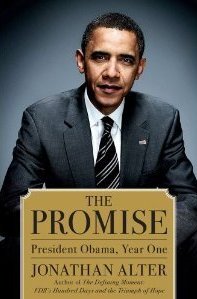Book Report by George Kennedy

Much has been written about President Barack Obama as our nation’s first African-American president. He is scorned by his detractors who lived to see what for them was the implausibility of a Black person becoming president. Alter does not write in such explicit terms but this view does partially explain some of the opposition to President Obama that he describes. The president’s base (Blacks, Jews, Liberals, Moderates/Progressives, and some Independents), Alter notes, is rightly concerned about the White House obsession with bi-partisanship at their expense.
Jonathan Alter is a well-respected national affairs columnist and author. This latest publication takes us into the heart of the Obama Administration and contrasts Obama the presidential candidate with Obama the President. I like his book not only because he confirms my assessment of this White House (and that of many supporters of this president), but also because his conclusions, or observations, are grounded in logic, admissions by the president and his team, and the author’s experience and extensive knowledge of Washington’s political culture.
Alter describes in detail the “big tactical mistakes”, the missed opportunities, and the naïveté of an over-confident president regarding the entrenched political culture in our nation’s capitol. The White House approach to health-care reform has to rank first on a list of big tactical mistakes. While reading the book, I could not help but wonder, did the president actually believe he could, or would be allowed to, change over two hundred years of political culture shaped, nurtured, and maintained by men who did not look like him? Was this hubris, or just plain naïveté?
Also, did this president not understand the many roles Americans expect their president to assume? Remaining above the political fray ensconced in the tidy sanctity of his brain created the impression of a chief executive distanced from those who believed his rallying cry “Yes We Can!” Where was the “We”, they asked? Americans did not want to see him allowing an issue to fester to the point of explosion and then ride to the rescue with a big speech. If your preferred strategy is to focus on the big speech, you restrict your options and you have to connect, especially with a confused and angry public. Alter suggests President Obama may have been too invisible on occasion or failed to capture the tide of public sentiment when a timely response would have given him more leverage against the persistence of his most vocal critics and enemies. I can only imagine that governing in a 21st Century media climate requires a president to be more sensitive to how quickly the tide of public opinion can be shifted, more nimble and fleet of foot, and certainly to have more arrows in their quiver than the big speech if you expect to put “points on the board” and be given credit for them.
The reality, Alter points out, is today’s empathic president has to be tomorrow’s point man taking on Wall Street, Big Pharma, and an intractable Republican opposition whose only policy prescription for everything is “No!” The author asks the question, did the president focus too much on process while disdaining tactics? I think he did. Sometimes, even a president has to get his hands a little soiled – especially today!
Alter rightly identifies a monumental self-confidence which if not more calibrated to the realities of governing in a messy political climate made even more poisonous by those who do not apologize for injecting race into everything, could complicate his quest for a second term.
Where I am in total, lockstep agreement with Alter is his conclusion that the president focused too much on policy and not enough on connecting. As a candidate, Obama connected with his message of “Change We Can Believe In”; as president, he often failed to do so. That has hurt him. The next six months will reveal if this flaw will persist. If so, Democratic Congressional survivors of the 2010 Mid-terms may tack to the right and eschew any offers to appear with the president for 2012.
This is a persuasive, fresh, and balanced read. I would urge any serious observer of American politics to read it before the Mid-terms this November.
Jonathan Alter, a Chicago native, is the author of the bestseller The Defining Moment: FDR’s Hundred Days and the Triumph of Hope.” He is a national affairs columnist for Newsweek and an analyst for NBC News and MSNBC. He lives in Montclair, New Jersey.
